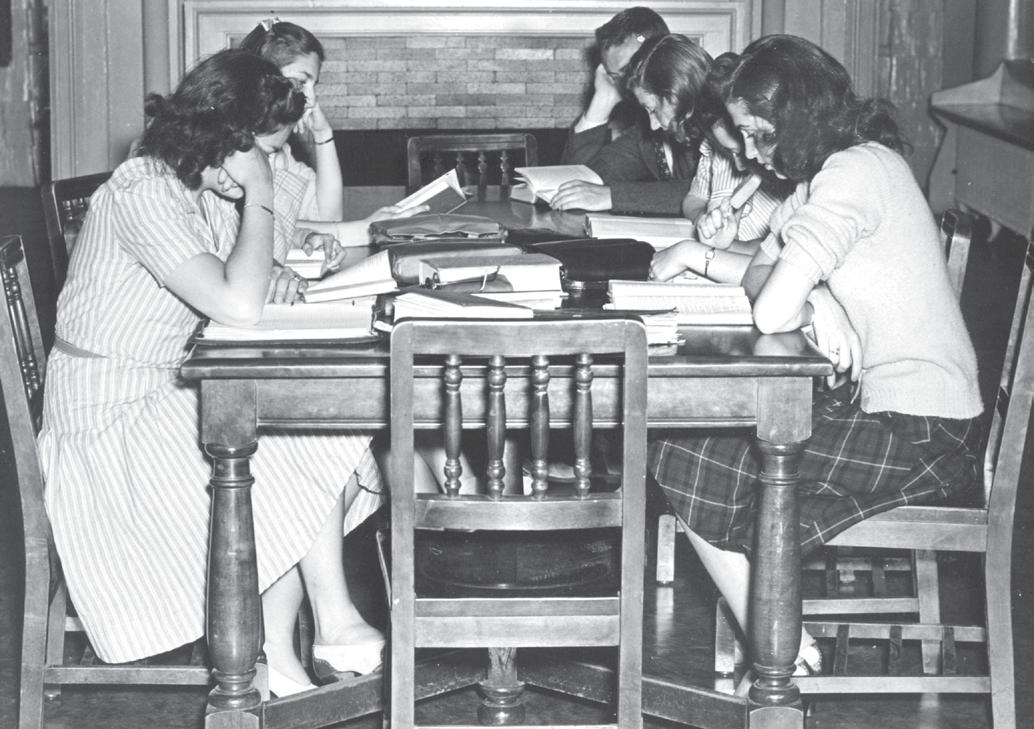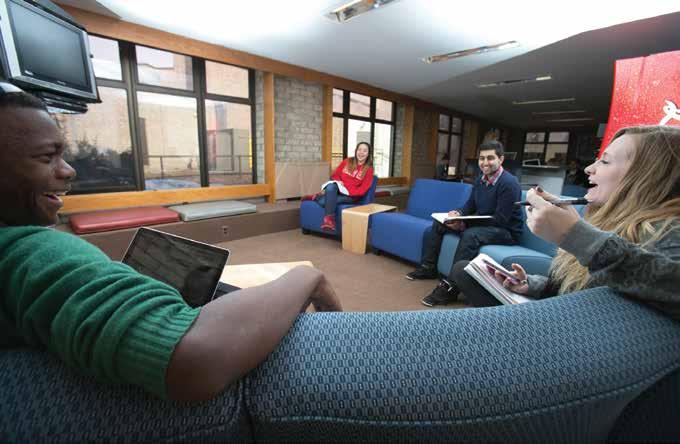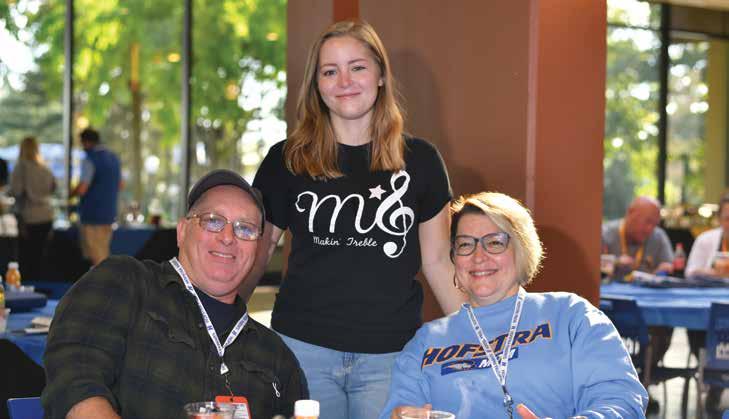
6 minute read
Student Academic Expectations
Many students ask whether college classes will be more difficult than the classes they took in high school. Often, the answer is yes; the material will be more advanced than what students have seen before, and our expectation of the way students will engage with material in college is very different from the way they did in high school. In other words, even if students are reading the same book they read in high school, we expect that they will study it differently. They will need to engage in deeper analysis of subject matter and style, bring knowledge from other subjects to that analysis, support their opinions by drawing on that knowledge, and write more complex papers than they did in high school.

Advertisement
College requires students to take responsibility for their own education in ways they haven’t typically done before. They must motivate themselves to study during days that often have little structure. Attending class is essential. Their level of preparation for class will determine how much they get out of it, so they have to do their homework and reading, even if the professor doesn’t collect the homework or test their knowledge in class.
Learning to self-motivate and manage one’s time is a skill that can often be challenging for students to master. To be successful, students should expect to devote two hours of outof-class time for every hour of in-class time. For a 15-credit semester, this equates to 30 hours of preparation and studying per week. For this reason, we tell students they need to commit to college as they would to a full-time job.
Academic FAQ
Do students have to take WSC 001 and 002 (Writing Studies and Composition)?
Yes. All students must take WSC 001 and 002 and must receive a minimum grade of C- as part of the University’s general requirements. All students are also required to pass the Writing Proficiency Exam before they graduate. The Writing Proficiency Exam is offered at the end of WSC 002. Students can contact the Writing Studies and Rhetoric Department to inquire about other dates and times that this exam may be offered. Transfer students who have received credit for WSC 002 at a previous institution must still pass the Writing Proficiency Exam at Hofstra. Passing the exam is a graduation requirement for all undergraduate students at Hofstra. Students who do not pass the exam should contact the Writing Proficiency Exam coordinator for further support. Students pursuing a BA in Hofstra College of Liberal Arts and Sciences must also complete two Writing Intensive courses.
How do students change course schedules?
Students should meet with their advising dean in the Center for University Advising (CUA) and faculty advisor, if applicable, to discuss course options. Once an advising dean or faculty advisor has approved a schedule change, students may make the change during the first week of classes by either (1) registering online through the portal; or (2) having their dean sign a registration Add/Drop Form. This form must be brought to the Student Financial Services Suite, located on the second floor of Memorial Hall. Most students are able to make changes online. However, students on academic probation are unable to register or change their schedule online; they will need approval from their advising dean in the CUA. Beginning the second week of the semester, students need departmental approval to add courses, and must process any changes in person at the Student Financial Services Suite in Memorial Hall.
How do students register for a course after the first week of classes?
All courses are considered closed as of the second week of classes. A student needs departmental approval or the professor’s permission for entrance to a course. The procedure for this requires students to contact the department and request that an override be initiated on their behalf to allow late registration. Once the override is approved, the student can register through the portal as usual.
Please be aware that additional charges may be incurred for the change(s). Any financial impact can be discussed with a Student Financial Services counselor prior to making the registration change.
How do students change majors?
The first step is to make an appointment with a faculty advisor from the department of the prospective major to discuss the major and curriculum requirements. The next step is to complete a Change of Study Request in the student portal.
The academic department(s) will review the request after it is submitted, contacting the student if they need any additional information. If the request is approved, the student’s record will be updated, and they will be notified by email that the change has been made.
What grades are required to make the Dean’s List?
To qualify for the Dean’s List, a student entering Hofstra in fall 2012 or later must meet the following requirements:
• Must have a minimum GPA of 3.5.
• A full-time student must complete at least 12 hours per semester in letter grades other than P and with no grades of I (Incomplete).
• A part-time student must complete at least 12 hours over the two most recent semesters in attendance, must earn letter grades other than P and with no grades of I, and must not have been a full-time student during the period under consideration.
Only courses taken in residence at Hofstra may be used to satisfy the requirements for the Dean’s List.
Students who achieve a 4.0 GPA and complete at least 12 semester hours of A grades in any given semester are designated Provost’s Scholars and are invited to attend special lectures and discussions. Only courses taken in residence at Hofstra may be used to satisfy the requirements for the designation of Provost’s Scholar.
What grade point average is necessary to graduate with distinction?
Degrees of distinction, “Latin Honors” are conferred upon students who have completed at least 82 semester hours in residence at Hofstra. Minimum GPAs for the levels of distinction are:
Summa cum laude: 3.85
Magna cum laude: 3.75
Cum laude: 3.60
What happens if a student’s GPA falls below 2.0?
Students with a GPA below 2.0 are put on academic probation and are required to meet with their advising dean in the Center for University Advising (CUA). When a student’s GPA falls below 2.0, the Office of Academic Records and Registrar sends a letter of notification to the student’s Hofstra Pride email account and permanent address (as listed on the portal). Students on academic probation must meet with their advising dean to create an academic action plan and receive an alternate PIN in order to register for the next semester.
For more information regarding academic probation, please refer to the Hofstra University Undergraduate Bulletin at bulletin.hofstra.edu. Student-athletes on academic probation may be ineligible for season play according to NCAA guidelines.
How does a student maintain their academic scholarship?

Students receiving an academic scholarship must maintain a cumulative GPA of 2.8 or better and earn a minimum of 24 credits per academic year. Students who fail to earn a 2.8 during their first semester will be invited to the CUA to create a scholarship action plan with their advising dean. Scholarship action plans recommend steps like working with faculty during their office hours and regularly consulting with members of the student’s academic support team.
How can students get a tutor?
How much does it cost?
Peer tutoring is available for many undergraduate courses across majors. Students who wish to obtain a tutor may schedule an appointment online through Navigate, found in the Hofstra portal at my.hofstra.edu or they may stop by the Center for Academic Excellence, Axinn Library, third floor. Students may receive tutoring in up to three courses per semester, for up to 90 minutes per course per week. Tutorial services are provided free of charge to all eligible students and begin at the end of the change of program period, which is the third week of the term. In addition to the Undergraduate Tutorial Program (UTP), students may also visit the Writing Center and the Mathematics Tutoring Center for assistance, free of charge.
What happens if a student simply stops going to classes?
If a student stops going to class, a grade of F (Failure) or UW (Unofficial Withdrawal) may be assigned. A student is not automatically withdrawn from the course if they stop attending. Specific deadlines for dropping courses are listed at hofstra.edu/deadlines
What happens if a student is granted the option of an Incomplete in a course?
A student unable to complete a course may receive an I (Incomplete) only if this option is discussed with the professor in advance and the student is granted permission. Incompletes are reserved for extenuating circumstances, such as medical emergencies. Students should speak to their professor about making up any missed work. A time frame for completion of work will be decided by the faculty member; however, the time frame should not exceed the last day of the next full semester following the granting of the I grade. If a student does not submit the incomplete work by the contracted deadline, the I grade will convert to the contingency grade provided by the professor. Not attending classes and missing exams does not constitute exemption or withdrawal from the course.
How many credits are required for each undergraduate class level?
First-year student: fewer than 30 credits

Sophomore: 30-59 credits
Junior: 60-89 credits
Senior: 90+ credits




